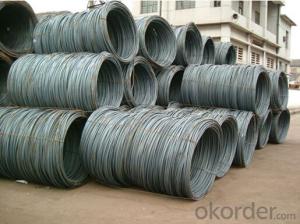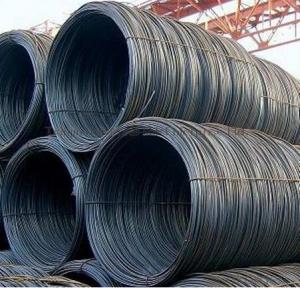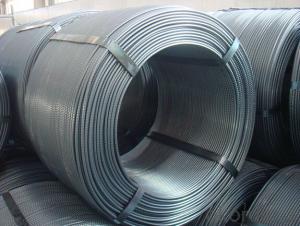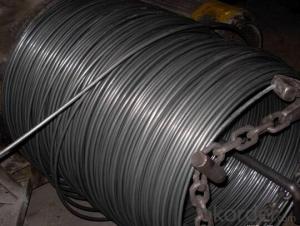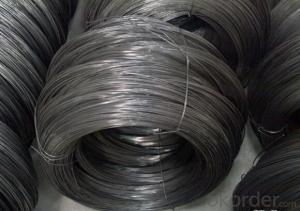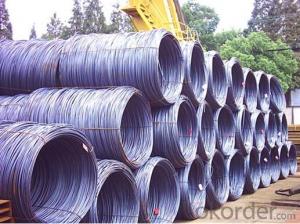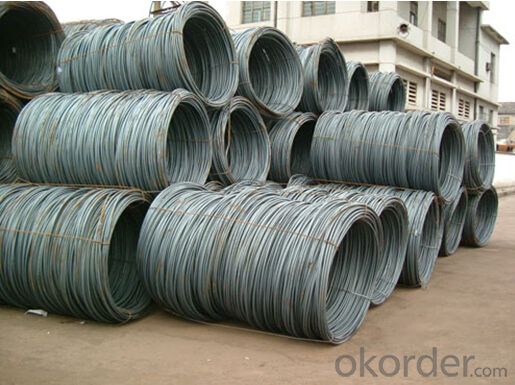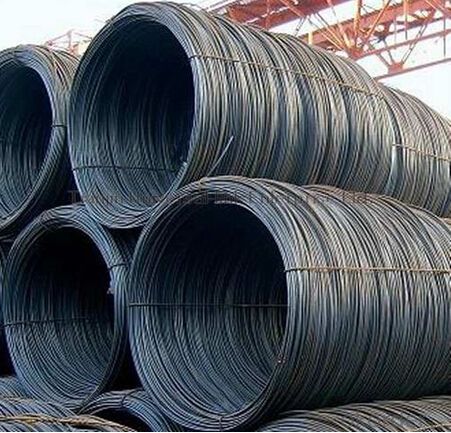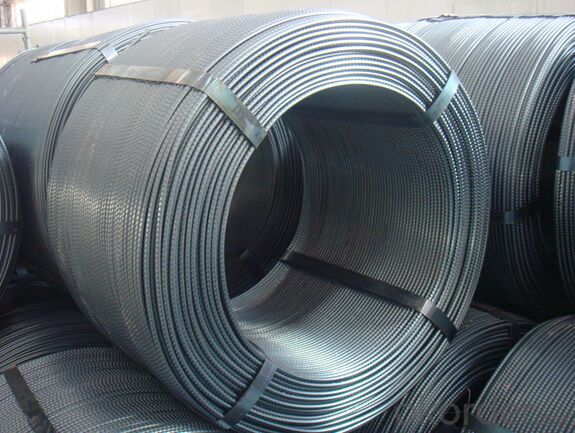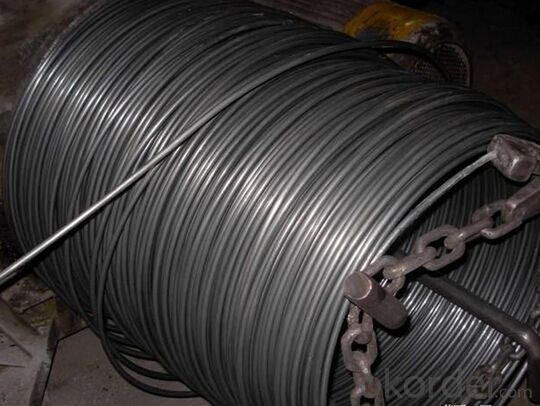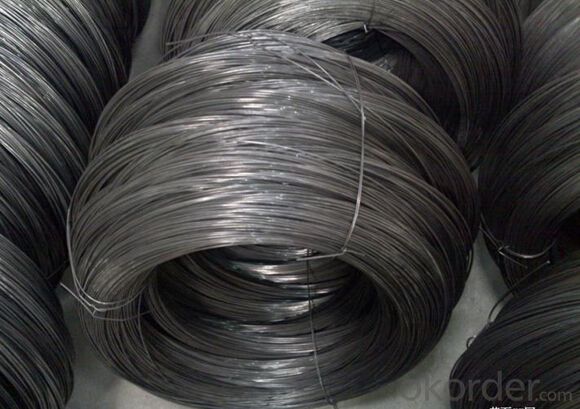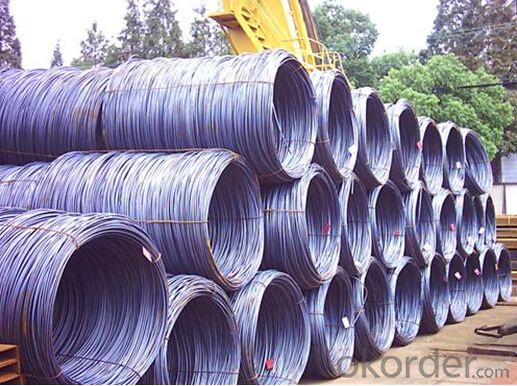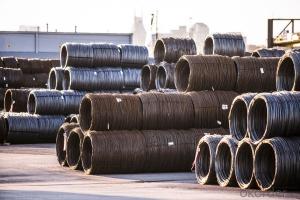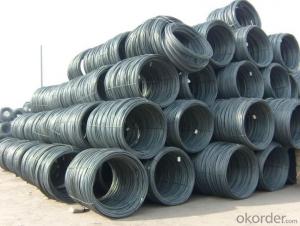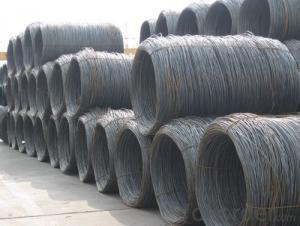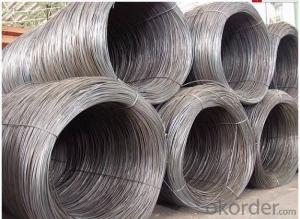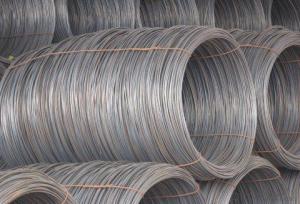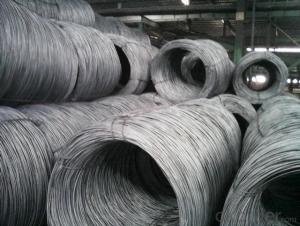SAE 1008Cr Low Carbon 6.5mm Wire Rod for Constructionr
- Loading Port:
- Tianjin
- Payment Terms:
- TT OR LC
- Min Order Qty:
- 3 m.t.
- Supply Capability:
- 10000 m.t./month
OKorder Service Pledge
Quality Product, Order Online Tracking, Timely Delivery
OKorder Financial Service
Credit Rating, Credit Services, Credit Purchasing
You Might Also Like
Specification
Type:
Stainless Steel,Deformed Steel,Gear Steel,Bearing Steel,Spring Steel,Alloy Steel,Carbon Steel
Shape:
Steel Billets,Steel Round Bar,Steel Angle,Steel Square Bar,Steel Flat Bar,Steel Wire Rod,Steel Sheet,Steel Coil
Technique:
Hot Rolled,Cold Rolled,Cold Drawn,ERW,Forged,Saw,Extruded,EFW,Spring
Surface Treatment:
Coated,Copper Coated,Color Coated,Oiled,Dry,Chromed Passivation,Polished,Bright,Black,PVDF Coated,Galvanized
Certification:
ISO,SGS,BV,IBR,RoHS,CE,API,BSI,UL
Thickness:
5.5mm-14mm
Width:
5.5mm-14mm
Length:
In coils
Outer Diameter:
5.5mm-14mm
Net Weight:
2m.t.
Packaging:
Seaworthy packaging
SAE 1008Cr Low Carbon 6.5mm Wire Rod for Constructionr
Detailed Information of the SAE 1008Cr Low Carbon 6.5mm Wire Rod for Constructionr
| Name | Hot Rolled High Carbon Wire Rod |
| Shape | Round Bar/Square Bar/Flat Bar/Plate/Wire |
| Standard | GB/ASTM/SAE/AISI/DIN/JIS/EN/BS |
| Surface Treatment: | Black/Peeling/Polished/Machined |
| Delivery Condition: | Hot Rolled or Forged/Peeled or Black Surface |
| Test | SGS/UT 100% Elements Testing |
| Certificate: | ISO/Mill Certificate |
| Service: | 24 hours online service / |
| more than 20 years trading and manufacture | |
| Quality Assurance: | the third party inspection, such as SGS, BV, TUV…etc. is acceptable |
| Packaging Details: | Seaworthy Packaging or as per customer's packing instruction |
Chemical Composition of the SAE 1008Cr Low Carbon 6.5mm Wire Rod for Constructionr
| Grade | Chemical Composition(%) | |||||
| C | Mn | Si | S | P | B | |
| SAE1008 | 0.1max. | 0.3~0.50 | 0.15max | 0.050max | ≤0.040 | >0.0008 |
| Mechanical properties | ||||||
| Yield strength(N/mm2) | Tensile strength(N/mm2) | Elongation(%) | ||||
| 250-280 | 350-380 | ≥32 | ||||
Company Introduction the SAE 1008Cr Low Carbon 6.5mm Wire Rod for Constructionr
CNBM International Corporation is the most import and export platform of CNBM group(China National Building Material Group Corporation) ,which is a state-owned enterprise, ranked in 270th of Fortune Global 500 in 2015.
With its advantages, CNBM International are mainly concentrate on Cement, Glass, Iron and Steel, Ceramics industries and devotes herself for supplying high quality series of refractories as well as technical consultancies and logistics solution.
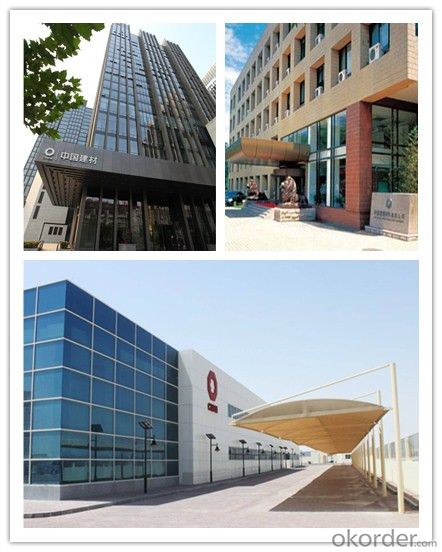
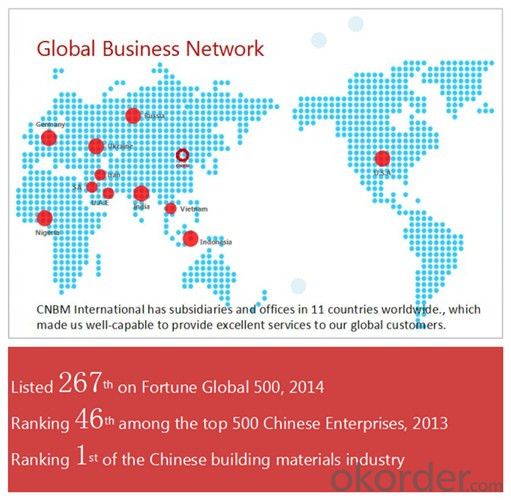
| After-sale service | CNBM provides the services and support you need for every step of our cooperation. We’re the business partners you can trust; you can relax and get on with doing business. |
| For any problem, please kindly contact us at any your convenient time, we’ll reply you in our first priority within 24 hours | |
| Advantages | Industry experience over 20 years. |
| Shipment of goods -More than 70 countries worldwide. | |
| The most convenient transport and prompt delivery. | |
| Competitive price with best service. | |
| High technical production line with top quality products. | |
| High reputation based on best quality products. |
Packaging & Delivery the SAE 1008Cr Low Carbon 6.5mm Wire Rod for Constructionr
| Packaging Detail | Sea worthy packing /as per customer's packing instruction |
| Delivery Detail | 15 ~ 40 days after receiving the deposit |
Products Show
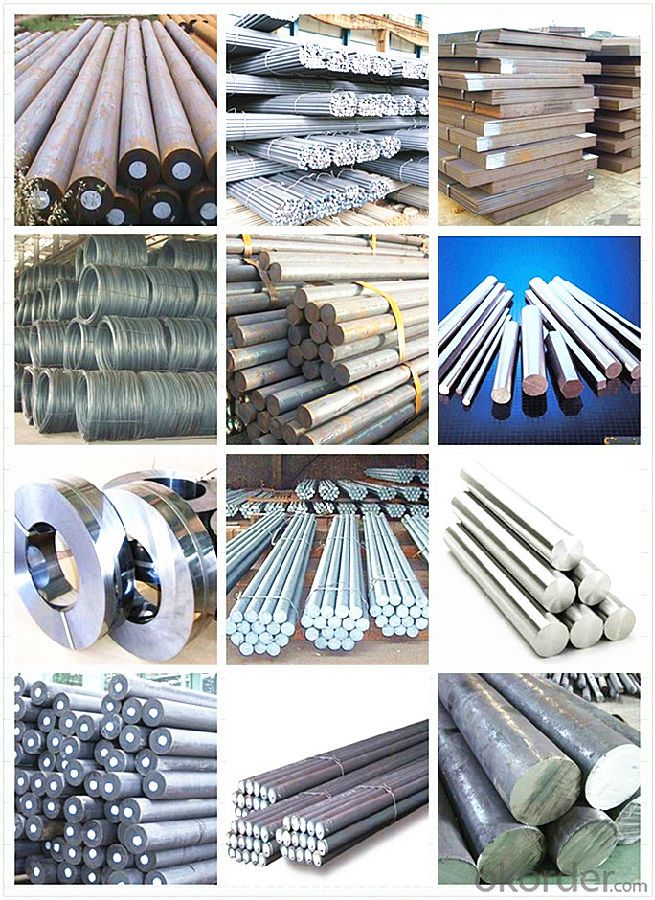
FAQ:
| Are you a trader or manufacturer? | Manufacturer |
| What’s the MOQ? | 3 metric ton |
| What’s your delivery time? | 15-35 days after downpayment received |
| Do you Accept OEM service? | Yes |
| what’s your delivery terms? | FOB/CFR/CIF |
| What's the Payment Terms? | 30% as deposit,70% before shipment by T/T |
| Western Union acceptable for small amount. | |
| L/C acceptable for large amount. | |
| Scrow ,Paybal,Alipay are also ok | |
| Why choose us? | Chose happens because of quality, then price, We can give you both. |
| Additionally, we can also offer professional products inquiry, products knowledge train (for agents), smooth goods delivery, excellent customer solution proposals. | |
| What's your available port of Shipment? | Main Port, China |
| What’s your featured services? | Our service formula: good quality+ good price+ good service=customer's trust |
| Where are your Market? | Covering more than 160 countries in the world |
- Q: What are the different surface finishing techniques for special steel parts?
- Special steel parts can undergo various surface finishing techniques to enhance their appearance, protect against corrosion, and improve overall performance. Some commonly utilized methods include: 1. Achieving a smooth and glossy surface on the steel part through polishing, using abrasives. This technique not only enhances aesthetics but also enhances resistance against corrosion. 2. Plating involves depositing a layer of metal onto the steel part's surface, with options such as chrome, nickel, and zinc. This technique provides additional protection against corrosion, improves wear resistance, and can offer desired color or finish. 3. Powder coating entails electrostatically applying a dry powder to the steel part's surface, followed by heat curing. The melted powder forms a durable and visually appealing coating that provides excellent resistance against corrosion, impact, and chemicals. 4. Anodizing, primarily used for aluminum but applicable to certain special steel parts, creates a controlled oxide layer on the surface. This enhances corrosion resistance, improves appearance, and can even provide insulation. 5. Employing a chemical process known as passivation removes free iron and contaminants from the steel part's surface. This process helps prevent corrosion and enhances resistance against staining or discoloration. 6. Heat treatment involves altering the physical and mechanical properties of the steel part by subjecting it to heating and cooling. This process improves hardness, strength, toughness, and provides desired surface finishes. 7. Through electropolishing, an electrochemical process, a thin layer of metal is removed from the steel part's surface. This technique eliminates surface imperfections, smoothens the part, and enhances corrosion resistance. Choosing the appropriate surface finishing technique is crucial, taking into consideration the specific requirements of the special steel part, including its function, desired appearance, and the environmental conditions it will encounter.
- Q: How does special steel contribute to the aerospace industry?
- Special steel contributes to the aerospace industry by offering several key benefits. Its high strength-to-weight ratio makes it ideal for constructing lightweight yet durable components, improving fuel efficiency and overall performance of aircraft. Additionally, its exceptional resistance to corrosion, heat, and extreme conditions ensures the longevity and reliability of aerospace structures. Special steel also enables the production of intricate and complex parts, enhancing the design flexibility and safety of aircraft.
- Q: How does special steel contribute to the automotive noise reduction?
- Special steel contributes to automotive noise reduction in several ways. Firstly, it is durable and strong, allowing for the construction of thinner and lighter components. This reduces the overall weight of the vehicle, resulting in reduced road and engine noise. Additionally, special steel has excellent vibration-damping properties, which helps absorb and minimize noise generated by the engine, suspension, and other moving parts. The use of special steel in the design of automotive structures and panels also helps reduce noise transmission from the outside environment into the cabin, providing a quieter and more comfortable driving experience for passengers.
- Q: How does special steel ensure dimensional stability?
- Special steel ensures dimensional stability through a combination of factors such as controlled composition, precise heat treatment, and careful manufacturing processes. The specific composition of special steel is designed to have a lower coefficient of thermal expansion, which means it expands and contracts less with changes in temperature compared to regular steel. This ensures that the dimensions of the steel remain stable even under varying temperature conditions. Additionally, the heat treatment process further enhances the dimensional stability by refining the microstructure and reducing internal stresses. The careful manufacturing processes, including precise machining and quality control, also contribute to maintaining dimensional stability in special steel products.
- Q: How does special steel resist oxidation?
- The outstanding resistance to oxidation exhibited by special steel is well-known. This is mainly attributed to the inclusion of elements like chromium, nickel, and manganese in its composition. These elements combine to create a passive film, known as a protective layer, on the steel's surface. This film effectively shields the steel from oxygen and moisture. Chromium is the principal element responsible for the oxidation resistance of special steel. It undergoes a reaction with atmospheric oxygen, resulting in the formation of a thin layer of chromium oxide on the steel's surface. This oxide layer is exceptionally stable and prevents any further oxidation of the underlying metal. It acts as a protective shield, hindering the penetration of oxygen and moisture into the steel, which could otherwise lead to corrosion or rusting. Moreover, nickel and manganese also contribute to the oxidation resistance of special steel. They assist in stabilizing the passive film created by chromium oxide and enhance its protective properties. These elements also bolster the steel's ability to withstand high temperatures and corrosive environments. Furthermore, the composition and processing techniques employed in the production of special steel play a vital role in its oxidation resistance. The steel is often subjected to heat treatment processes, such as annealing or quenching, which further enhance its resistance to corrosion. Through meticulous control of alloying elements and precise heat treatment procedures, a robust and long-lasting passive film is formed. In conclusion, special steel's ability to resist oxidation is primarily due to the presence of chromium, nickel, and manganese, which collaborate to create a protective layer on its surface. This passive film acts as a barrier against oxygen and moisture, effectively preventing corrosion and rusting. Additionally, the composition and processing techniques utilized during production significantly contribute to the exceptional oxidation resistance of special steel.
- Q: How does special steel contribute to improved product aesthetics?
- Special steel contributes to improved product aesthetics in several ways. Firstly, special steel can be formulated to have a higher level of purity, resulting in a cleaner and more polished appearance. This enhances the overall visual appeal of the product. Additionally, special steel can be engineered to have unique surface finishes, such as brushed or mirror-like effects, which can add a sophisticated and luxurious touch to the product design. Furthermore, special steel can be shaped and molded with precision, allowing for intricate and intricate designs that enhance the aesthetics of the product. Overall, the use of special steel in manufacturing helps to elevate the visual appeal of products, making them more attractive and visually pleasing to consumers.
- Q: How does special steel perform in high-vibration applications?
- Special steel performs exceptionally well in high-vibration applications due to its superior strength, durability, and resistance to fatigue. These properties enable it to withstand intense vibrations without compromising its structural integrity, resulting in enhanced performance and extended service life in such demanding conditions.
- Q: What are the requirements for special steel used in marine applications?
- Special steel used in marine applications must meet certain requirements to ensure its durability and performance in the harsh marine environment. These requirements typically include high corrosion resistance to withstand exposure to saltwater, excellent strength and toughness to withstand extreme forces and impacts, good weldability for ease of fabrication and maintenance, and low magnetic permeability to avoid interference with electronic equipment. Additionally, the steel must be able to withstand fluctuating temperatures and be resistant to fatigue and stress corrosion cracking to ensure long-term reliability in marine applications.
- Q: Is special steel suitable for marine applications?
- Marine applications necessitate materials capable of enduring high levels of moisture, exposure to saltwater, and environmental factors such as temperature fluctuations and the impact of waves. Special steel, also known as marine grade stainless steel, is specifically engineered to withstand the challenging conditions prevalent in marine environments. Its exceptional resistance to corrosion, particularly in the presence of saltwater, renders it highly appropriate for diverse marine applications. Distinguished by a greater proportion of chromium and nickel compared to standard steel grades, special steel augments its corrosion resistance properties. Furthermore, it is frequently alloyed with molybdenum, titanium, or other elements to further enhance its resistance to pitting, crevice corrosion, and chloride-induced stress corrosion cracking. Shipbuilding, offshore oil and gas platforms, marine equipment and machinery, marine pipelines, as well as marine architecture and structures are among the common marine applications that derive benefits from special steel. Additionally, special steel is employed in the construction of naval vessels, submarines, and offshore wind farms. To summarize, special steel is exceptionally well-suited to marine applications due to its exceptional resistance to corrosion, durability, and strength. It effectively withstands the rigorous conditions present in marine environments, ensuring the longevity and dependability of marine structures and equipment.
- Q: How is the hardness of special steel measured?
- The hardness of special steel is typically measured using methods such as Rockwell, Brinell, or Vickers hardness tests, which involve indenting the steel surface with a known force and measuring the resulting indentation size.
Send your message to us
SAE 1008Cr Low Carbon 6.5mm Wire Rod for Constructionr
- Loading Port:
- Tianjin
- Payment Terms:
- TT OR LC
- Min Order Qty:
- 3 m.t.
- Supply Capability:
- 10000 m.t./month
OKorder Service Pledge
Quality Product, Order Online Tracking, Timely Delivery
OKorder Financial Service
Credit Rating, Credit Services, Credit Purchasing
Similar products
Hot products
Hot Searches
Related keywords
